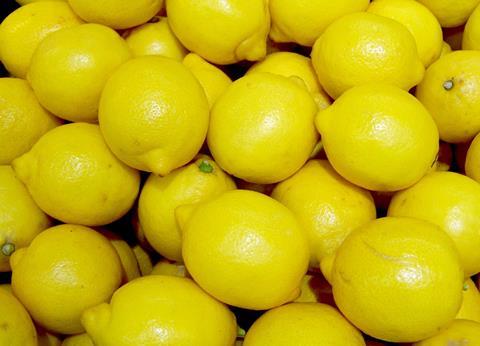
South Africa’s decision to keep its organic lemons out of the European Union this year is regarded as a short-term measure, according to industry sources, one designed to avoid unnecessary risks at a time when the country is hoping to sort out its wider dispute with the EU over handling of the citrus black spot (CBS) issue.
In recent days, however, it has become clear that trade leaders in South Africa still believe that their only option in terms of resolving the matter will be to pursue it further at the World Trade Organisation.
“It makes no sense for us to introduce or increase our efforts to limit the risk as long as the EU continues with its present way of handling the CBS matter,” commented Deon Joubert, the South African citrus industry’s special envoy to the EU.
The decision to ban shipments of organic lemons to the EU appears to be yet one more effort by the South Africans in terms of risk management which will stand them in good stead when the matter finally reaches the WTO.
Joubert said a South African delegation which visited the EU headquarters in Brussels towards the end of March was aimed at engaging all stakeholders and the EU Commission regarding the SA Industry plans for 2016.
It was also used to take stock of the country’s performance on CBS over the past few seasons and gauge the developments and sentiments in Europe.
“Suffice to say that the SA count on CBS, which reduced from 35 [in 2013], 28 [in 2014] to 15 [in 2015] was unilaterally applauded as a job well done,” Joubert continued.
“SA has continuously acknowledged its responsibility to work within the current EU framework and show responsible mitigation of the perceived CBS risk. Over the past three years, the growers, exporters and DAFF with PPECB worked and reworked the SA risk management system to strengthen its effectiveness, and the positive trend of results over this time demonstrates that it has worked.”
He added that such efforts had come at a cost of R1bn to the South African citrus industry, suggesting that this underlined a high level of compliance, regardless of the fact that scientists from around the world have concluded that there was no risk of CBS being transferred from South African fruit to European orchards.
According to Joubert, CGA growers have further demonstrated their responsible demeanour by exceeding requirements in the RMS and taking bold decisions to stop commodities or suspend exports when it viewed this to be required: “All the above was conveyed to the EU Commission and stakeholders in Europe while SA undertook to continue on this path during 2016.”
Good level of co-operation
He noted that the South African citrus industry was generally pleased with the level of co-operation seen from individual EU countries and their inspection services during 2015. This included full access to each CBS interception dossier and the viability tests conducted on those interceptions.
As a result, South African officials had been able to analyse each case and improve the country’s risk management system.Visits to member states’ laboratories by a South African technical delegation under the competent leadership of DAFF during 2015 further had also enhanced confidence on both sides, he claimed.
“In the same spirit the SA citrus industry has decided to announce that organic South African lemons would not be exported to the EU this year as part of a core of responsible conduct from our SA grower fraternity,” Joubert revealed.
He explained that the decision had been taken voluntarily by the organic lemon producers, despite the cost to them. “There is not really a market outside the UK and the EU which can take up this fruit and it will have to be sold in general lemon markets, perhaps at lower prices. However, this will also allow them to further work on risk mitigating measures of CBS in their product range, while significantly reducing the risk of SA CBS interceptions in Europe during 2016.”
He concluded: “South Africa is confident that all these measures will once again result in Europe experiencing SA citrus during 2016 for its most well-known characteristics, namely quality fruit of superior taste and supporting a healthy lifestyle.”






No comments yet